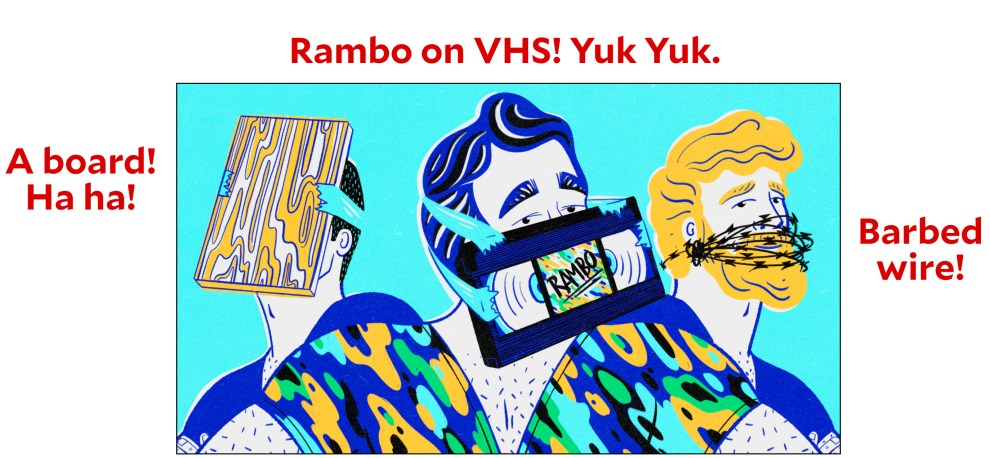
This is the illustration that accompanied Petri's piece. Hilarious, isn't it?Tara Jacoby/Washington Post
Over the weekend, Alexandra Petri favored us with a humorous column about men who refuse to wear masks:
Men, are you worried that wearing a mask is “submission” and “muzzling yourself” and “looks weak, especially for men”? Do you think that “I don’t see it,” except possibly at a “mask facility”?
Well, worry no longer! Introducing: Masks For Him! We put the “mask” in “toxic maskulinity”!
….We offer many masks, ranging from the Ultimate Mask (a VHS copy of “Rambo” you can duct tape to your face) to the HYPER-ULTIMATE MASK (a VHS copy of “Rambo” you can staple to your face)….This World War I inspired mask is made of razor wire! This mask says, “Not only do I misunderstand science, but I also misunderstand history!” It may not block particles of any size, but any coronavirus that crawls over that barbed wire is a coronavirus you can respect.
Etc.
Ha ha ha. That’s hilarious. And before anyone tells me: Yes, I get that this is just a joke. Only a scold could possibly object.
Then call me a scold, because this kind of crap needs to stop. There are lots of men who feel silly wearing a mask, and it’s not because they’re admirers of Mussolini or full-bore Trumpies. They’re just ordinary men who were born and raised in the culture of contemporary America.
And we need to persuade them to wear masks. But how? I can think of several possibilities, and of those the worst imaginable way is to mock them in the pages of the Washington Post. That accomplishes nothing except to piss them off and ensure that they will never, ever wear a mask.
Is that worth it for the sake of a little joke among college-educated friends? Maybe so in other times—that’s your call—but not now. We’re in the middle of a pandemic and we need to figure out how to get people to do the right thing. What’s more, we need to figure it out fast. If you’re serious about that, you have a choice to make. On the one hand, you can keep up the stupid condescension that we love so much. Perhaps that makes you feel better. On the other hand, we could mount a real campaign to persuade people to wear masks. We could blanket the airwaves. We could use celebrities who appeal to all types. We could explain exactly what masks do. And we could do it all without mocking anyone. Any takers?

















